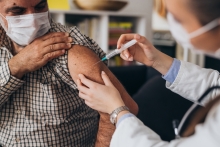Delaying second doses of COVID-19 vaccines should reduce case numbers in the near term; however, the longer term case burden and the potential for evolution of viral ‘escape’ from immunity will depend on the robustness of immune responses generated by natural infections and one or two vaccine doses, according to a study from McGill University and Princeton University published today in Science.


New research suggests that the impact of natural and vaccine-induced immunity will be key factors in shaping the future trajectory of the global coronavirus pandemic, known as COVID-19. In particular, a vaccine capable of eliciting a strong immune response could substantially reduce the future burden of infection, according to a study recently published in the journal Science.
After one week on the job, members of the federal government’s new immunity task force say they are coming to grips with a towering wall of uncertainty that obscures the true extent of COVID-19 in Canada.
Here is a list of experts from McGill, the McGill University Health Centre (MUHC) and the Lady Davis Institute of the Jewish General Hospital available for comment on your stories for World AIDS Day:
